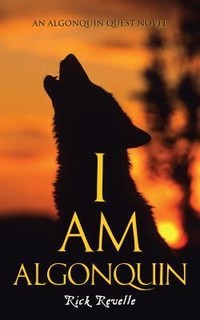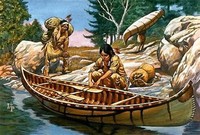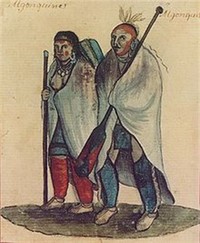Facts about Algonquin

Algonquin warriors continued to fight in alliance with France until the British conquest of Quebec in 1760.

Fighting on behalf of the British Crown, the Algonquins took part in the Barry St. Leger campaign during the American Revolutionary War.

The powerful Iroquois, historically the enemy of the Algonquins, aided first by the Dutch and later by the English, defeated the French and their Algonquin allies.

The first group of Algonquin that the French encountered were the Kitcisмpiriniwak whose village was located on an island in the Ottawa River; the French called this group La Nation de l'Isle.

Many Algonquins still speak the Algonquin language, called generally as Anicinаpemowin or specifically as Omаmiwininмmowin.

Today, most Algonquins live in Quebec; the nine Algonquin bands in that province and one in Ontario have a combined population of about 8,000.

Contemporary Algonquin communities are working to preserve Algonquin language, culture, and territorial jurisdiction.

An important ceremony for the Algonquins was the annual "Feast of the Dead."

Starting in 1721, many Christian Algonquins had began to summer at Oka, a Mohawk settlement near Montreal that was then considered one of the Seven Nations of Canada.

In 1982, members of the Algonquin tribe successfully blockaded a commercial rice-harvesting venture that was given federal governmental permission to harvest the wild rice that the tribe has traditionally gathered by hand for centuries.

The Algonquins (or Algonkins) are an aboriginal North American people speaking Algonquin, an Anishinaabe language.

French law made it easy for thousands of colons, ethnic or national French from former colonies of North and East Africa, India and Indochina to live in mainland France.

Later in the nineteenth century, the lumber industry began to move up the Ottawa valley, and the remaining Algonquins were relegated to a string of small reserves.

In 2000, Algonquins from Timiskaming First Nation played a significant part in the local popular opposition to the plan to convert Adams Mine into a garbage dump.

In 1632, after Sir David Kirke's occupation of New France had demonstrated French colonial vulnerability, the French began to trade muskets to the Algonquins and their allies.

Algonquin communities consisted of a number of separate bands, each with its own chief.

When the French arrived trading firearms for furs, the Algonquins responded to the opportunity to establish an alliance.

Other Algonquin bands included the Wаwаckeciriniwak (also known as the Weskarini, and the Algonquin proper), who lived along the north side of the Ottawa River.

At first, the term "Algonquin" was used only for a second group, the Wаwаckeciriniwak.

The first recorded meeting between Europeans and Algonquins occurred at Tadoussac in the summer of 1603, when Samuel de Champlain came upon a party of Algonquins, led by the Kitcisмpirini Chief Tessouat.

The term "Algonquin" is French, and may derive from the Maliseet word elakуmkwik (IPA: ), "they are our relatives/allies".

At the time of their first meeting with the French in the early seventeenth century, the various Algonquin bands probably had a combined population somewhere in the neighborhood of 6,000.

Popular usage reflects some confusion on this point, in that the term "Algonquin" has also been used to refer to all Algonquian-speaking societies.

Aided by the Dutch and the British, the Iroquois soon triumphed over the French and their Algonquin friends.

The Algonquin people call themselves either Omаmiwinini (plural: Omаmiwininiwak) or the more generalized name of Anicinаpe.

Tensions with the lumber industry have flared up among Algonquin communities, in response to the practice of clear-cutting.

The Sulpician Mission of the Mountain was founded at Montreal in 1677, and some Algonquins settled there together with Iroquois converts.

The Algonquins were practitioners of Midewiwin, the secretive religion of the aboriginal groups of the Maritimes, New England, and Great Lakes regions in North America.

After contact with the Europeans, the Algonquins became one of the key players in the fur trade.

The Algonquin Indians were the victims of unfortunate European politics.

A distinct Algonquin identity, though, was not fully-realized until after the dividing of the Anicinаpek at the "Third Stopping Place," near present day Detroit, around 2,000 years ago.

Traditionally, the Algonquins lived in cone-shaped tipi-like dwellings, rather than the usual North Eastern dome-shaped wigwams.

